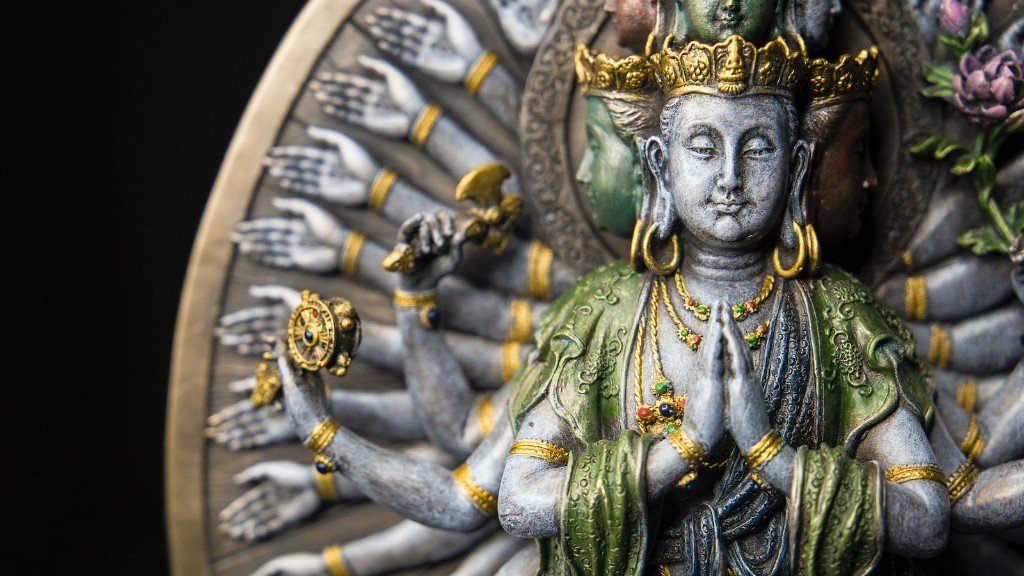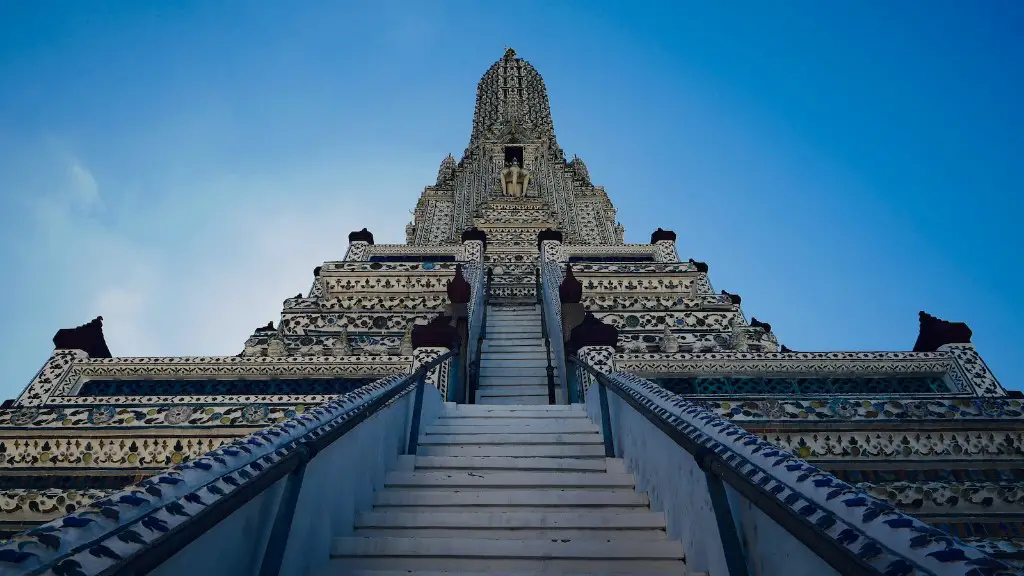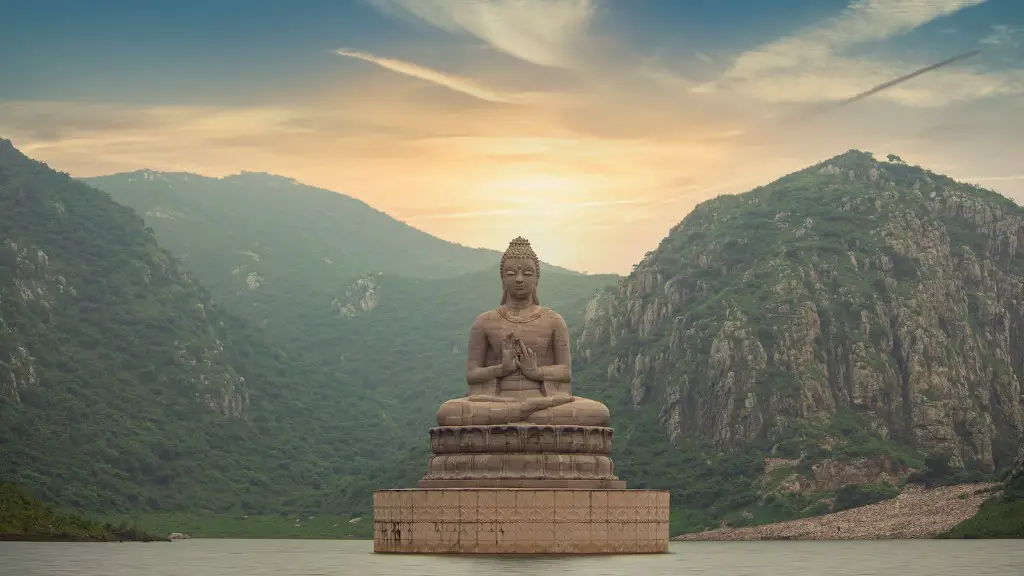Which Is The Most Powerful God In Hinduism
Hinduism is an ancient religion whose central practice revolves around worship of various gods and goddesses. Each of these deities is believed to represent certain forces of nature and possess certain powers. Among the countless deities, there are some which are deemed to be the most powerful and are held in the highest esteem. This article will explore and analyze which deity is the most powerful in Hinduism by exploring the attributes of some of the most popular and powerful figures.
Kali is one of the most powerful goddesses in Hinduism. She is associated with death, destruction, and time and is often depicted with a garland of skulls and a sword in her hands. Unlike other goddesses, Kali is not a benevolent force; instead, she embodies the destructive side of reality and is often seen as a fearsome figure. She is feared and revered for her immense power and ability to annihilate evil.
Lord Ganesha is one of the most widely revered deities and is widely worshipped by Hindus. He is often depicted as having the head of an elephant and the body of a human and is believed to be the remover of obstacles and the god of success and fortune. He is believed to bestow his blessings on people by removing the obstacles in their path. In addition to his ability to bless and remove obstacles, Lord Ganesh is also believed to possess immense power and strength, making him one of the most powerful gods in Hinduism.
Shiva is one of the three main gods and is sometimes referred to as the “destroyer” and the “transformer.” He is believed to be the ultimate power in Hinduism and is revered as the god of destruction and transformation. He is associated with death, creation and transformation and is believed to be able to control and direct the forces of nature. Shiva is also believed to possess immense power and strength which makes him one of the most powerful gods in Hinduism.
Vishnu is another of the three main gods in Hinduism and is sometimes referred to as the “preserver”. He is associated with mercy, compassion and creativity and is believed to be the source of all that is good and right in the world. He is often depicted as being omnipotent, omniscient and omnipresent, and is believed to be the preserver of all that exists. Furthermore, Vishnu is believed to possess immense supernatural powers which makes him one of the most powerful gods in Hinduism.
How Hindus Worship These Gods?
The Hindus believe that offering worship to the gods will bring about good fortune and rewards. Worshipping the gods is an integral part of the Hindu religion and there are several ways in which these powerful gods are worshipped. The most common form of worship is by offering of puja. This involves offering a combination of food-offerings, flowers, and incense to the gods. In addition, prayers are offered and verses are recited in order to invoke the gods and entreat them to grant favors. Hindus also make offerings of gold and silver, as well as other gifts in order to please the gods.
Another way of worshipping the gods is through chanting mantras. Mantras are powerful words that are believed to have the power to ward off evil spirits and bring good luck. Chanting mantras is believed to invoke the gods and bestow blessings upon the devotees. Additionally, Hindus also make use of images, such as statues of gods, to bring good fortune and seek blessings.
In addition to the physical forms of worship, Hindus also believe in performing daily activities for the benefit of the gods. This could include offering food and water, observing religious days and taking part in special ceremonies to honor and thank the gods. All these form of worship are believed to bring about the blessings of the gods, which are essential for a good life.
Goddesses in Hinduism
In Hinduism, there are many goddesses represented by powerful figures like Durga and Lakshmi. Durga is the goddess of power and is believed to be the embodiment of Shakti, or the divine feminine energy. She is the warrior goddess who is believed to possess immense power, strength and courage. As the goddess of war and battle, she is believed to be capable of protecting her devotees against evil forces.
Lakshmi is another powerful feminine figure in Hinduism and is the goddess of wealth and abundance. She is believed to bestow her blessings of love, prosperity and good fortune on her devotees. Furthermore, she is also believed to possess great power and strength, making her another one of the most powerful goddesses in Hinduism.
Saraswati is the goddess of knowledge and wisdom and is associated with music, art and science. She is believed to possess the power to bestow her devotees with the knowledge and wisdom needed to succeed in life. She is believed to be the source of creativity and inspiration and is also believed to have a great deal of spiritual and mental strength.
Kali is a fearsome goddess and is also known as the dark mother. She is believed to possess immense power and is sometimes seen as a destroyer of evil. She is deeply feared as a symbol of death and destruction, but is also revered as a powerful protector who can be called upon in times of need.
Rituals and Traditions in Hinduism
Hinduism is a religion that is steeped in traditions and rituals. These rituals and traditions are believed to bring about the blessings of the gods, as well as ward off evil forces. Rituals like puja and chanting mantras are a part of the daily lives of all Hindus and many families have certain traditions that they follow during special occasions like weddings or births.
In addition to these daily rituals, Hindus also observe certain festivals and holy days. These festivals often involve elaborate rituals and involve a great deal of worship and festivities, aiming to bring about the blessings of the gods. These festivals not only serve the purpose of worship, but also bring people together, creating a sense of unity within the community.
Hindus also believe in performing aarti, which is a type of ritual offering in which a lamp is lit and offerings of food, flowers and incense are made. This ritual is believed to bring about the blessings of the gods, as well as the presence of peace and harmony in the home. Aarti is performed in the morning, as well as in the evening, and is a central part of most Hindu worship.
Significance of These Gods in Hinduism
The gods of Hinduism are widely revered by its devotees and are held in the highest esteem. They are believed to be the source of great power and strength and are worshipped in order to receive their blessings and protection. These figures are seen as the embodiments of divine energy and represent the forces of nature, whether it be destruction, creation, knowledge or protection.
The worship of these deities has been an integral part of the Hindu religion since ancient times, and continues to be practiced by Hindus all over the world today. These gods are seen as symbols of strength, power, knowledge and prosperity and are seen as the protectors of the devotees.
In conclusion, the gods of Hinduism are powerful figures that are revered and worshipped by the devotees of the religion. Each deity is believed to possess certain powers and symbolize certain forces of nature. Among all these gods, the most powerful one is believed to be Shiva, the destroyer and transformer, who is believed to possess immense power and strength.
Interpretations of Its Scriptures
Hinduism is an ancient religion and its scriptures have evolved over time. Therefore, there are different interpretations of its texts and doctrines which have been discussed, debated and accepted by the devotees. These interpretations often differ from one another and have led to different schools of thought and belief systems within Hinduism.
For example, there are some who believe in a strict interpretation of the scriptures and maintain that there is only one way of reaching God or moksha. This interpretation follows dharma and dictates what is right behavior and what is wrong. On the other hand, there is a more liberal interpretation of the Hindu scriptures, which emphasizes self-realization and the exploration of one’s spiritual journey, often through various forms of yoga and meditation.
Furthermore, some Hindus believe in a polytheistic interpretation of their scripture and believe in the existence of many gods and goddesses, each of which are powerful figures. This interpretation is called henotheism and is widely accepted in Hinduism.
In addition to these interpretations, there are also different sects and traditions within Hinduism that have their own beliefs and practices. These sects are not necessarily in contradiction with one another, but instead emphasize different aspects of the Hindu religion. This allows for a greater diversity of beliefs, practices and customs within Hinduism and adds to its unique beauty.
Role of These Gods in People’s Lives
The gods of Hinduism play a significant role in the lives of Hindus. Not only are they worshipped and prayed to, they are also seen by many as protectors and sources of strength. In times of need, devotees look to the gods to gain strength and courage to carry on and overcome difficult circumstances.
Additionally, the gods are also seen as the embodiment of justice and morality. Hindus believe that by worshipping the gods and following their teachings, they are able to lead a righteous and prosperous life. Furthermore, the gods in Hinduism are also seen as symbols of luck and success and many devotees pray to them in order to seek these blessings.
The gods in Hinduism are also seen as omnipresent figures, who are believed to be present in all realms of existence. As such, Hindus believe that by worshipping the gods, they are able to feel the presence of the divine and tap into the power of the universe. Thus, the gods of Hinduism are deeply rooted in the daily lives of its devotees.
Impact of These Gods on the Society
The gods of Hinduism have had a great impact on the society of India and have played a significant role in shaping its culture and beliefs. From ancient times, the gods have been held in the highest esteem and reverence, and their influence has been felt in all aspects of life.
The deities of Hinduism are often seen as symbols of power, strength and morality. Thus, they have had a profound influence on the way people live their lives and conduct themselves. For example, the worship of the gods has led to the emergence of a code of conduct, which has been based on the teachings of the gods and further reinforces the belief that a life of righteousness will be rewarded.
Furthermore, the gods in Hinduism have also had an influence on the art and culture of India. Many Hindu stories, mythical narratives and works of art revolve around these gods, further highlighting the importance of their roles in the society. In addition, their presence has also been felt in music, dance and other forms of art, which have


